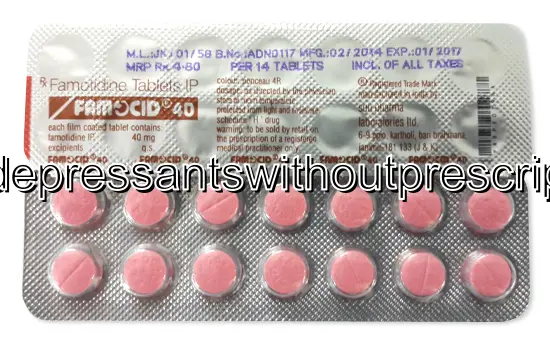| Package | Dosage | Price | Price per Dose | |
|---|---|---|---|---|
| Dosage: 20mg | ||||
| 336 pill | 20mg | AUD268.15 | AUD0.80 | |
| 224 pill | 20mg | AUD227.07 | AUD1.01 | |
| 168 pill | 20mg | AUD202.92 | AUD1.21 | |
| 112 pill | 20mg | AUD164.26 | AUD1.47 | |
| 84 pill | 20mg | AUD132.85 | AUD1.57 | |
| 56 pill | 20mg | AUD96.61 | AUD1.72 | |
| 28 pill | 20mg | AUD55.54 | AUD1.96 | |
| Dosage: 40mg | ||||
| 336 pill | 40mg | AUD309.22 | AUD0.92 | |
| 224 pill | 40mg | AUD243.99 | AUD1.09 | |
| 168 pill | 40mg | AUD202.92 | AUD1.21 | |
| 112 pill | 40mg | AUD157.01 | AUD1.40 | |
| 84 pill | 40mg | AUD120.77 | AUD1.45 | |
| 56 pill | 40mg | AUD94.20 | AUD1.67 | |
| 28 pill | 40mg | AUD50.71 | AUD1.79 | |

Famotidine Description
Overview of Famotidine
Famotidine is a medication that belongs to the class of drugs known as histamine H2 receptor antagonists. It is commonly used to reduce the amount of acid produced by the stomach. This medication is widely prescribed for conditions related to excess stomach acid, such as gastroesophageal reflux disease (GERD), Zollinger-Ellison syndrome, and peptic ulcers. Its effectiveness in decreasing acid secretion makes it a valuable tool in managing various gastrointestinal disorders.
How Famotidine Works
Famotidine works by blocking histamine receptors in the stomach lining. Histamine is a chemical that signals the stomach to produce acid. By inhibiting these receptors, Famotidine significantly decreases acid secretion. This reduction in acid helps to alleviate symptoms like heartburn, acid indigestion, and discomfort associated with acid-related damage. The drug generally acts more rapidly and effectively than some other older treatments, providing quick relief for many patients.
Uses and Benefits
This medication is primarily used to treat and prevent ulcers in the stomach and intestines. It also effectively manages symptoms of GERD, such as frequent heartburn. Patients with Zollinger-Ellison syndrome, a condition characterized by excessive acid production, often find Famotidine to be a crucial part of their treatment plan. Its ability to precisely control acid levels helps prevent complications such as bleeding or erosion of the gastrointestinal lining. Many users notice an improvement in their symptoms within a few days of starting therapy.
Administration and Dosage
Famotidine is typically available in tablet form, but it can also be administered via injections in some cases. The dosage varies depending on the condition being treated, the severity of symptoms, and individual patient factors. It is usually taken once or twice daily, preferably before meals or at bedtime. It is crucial to follow the prescribing doctor’s instructions to ensure the medication’s effectiveness and minimize potential side effects. Consistency in taking the medication as prescribed can lead to better management of acid-related conditions.
Possible Side Effects
While generally well-tolerated, Famotidine may cause side effects in some individuals. Common reactions include headache, dizziness, constipation, or diarrhea. Serious side effects are rare but may include allergic reactions such as rash, itching, swelling, or difficulty breathing. In some cases, changes in liver function or blood counts might occur. Patients are advised to seek medical attention if they experience any unusual or severe symptoms during treatment. Regular monitoring and communication with a healthcare provider are important during prolonged use.
Precautions and Interactions
It is essential to inform your healthcare provider about any other medications you are taking, as Famotidine can interact with certain drugs. For example, it may affect the absorption of drugs that require an acidic environment for proper absorption. Patients with kidney disease or liver problems should discuss with their doctor whether this medication is suitable for them. Pregnant or breastfeeding women should also consult their healthcare provider before starting Famotidine, as safety data is limited in these populations.
Summary of User Experience
Many users report that Famotidine effectively relieves their symptoms of acid reflux and peptic ulcers. The quick onset of action and generally mild side effects make it a popular choice among OTC and prescription medications. However, some individuals may need adjustments in dosage or alternative treatments if side effects occur or if the medication does not fully control their symptoms. Overall, Famotidine remains a trusted and reliable option for managing excess stomach acid and related conditions.
